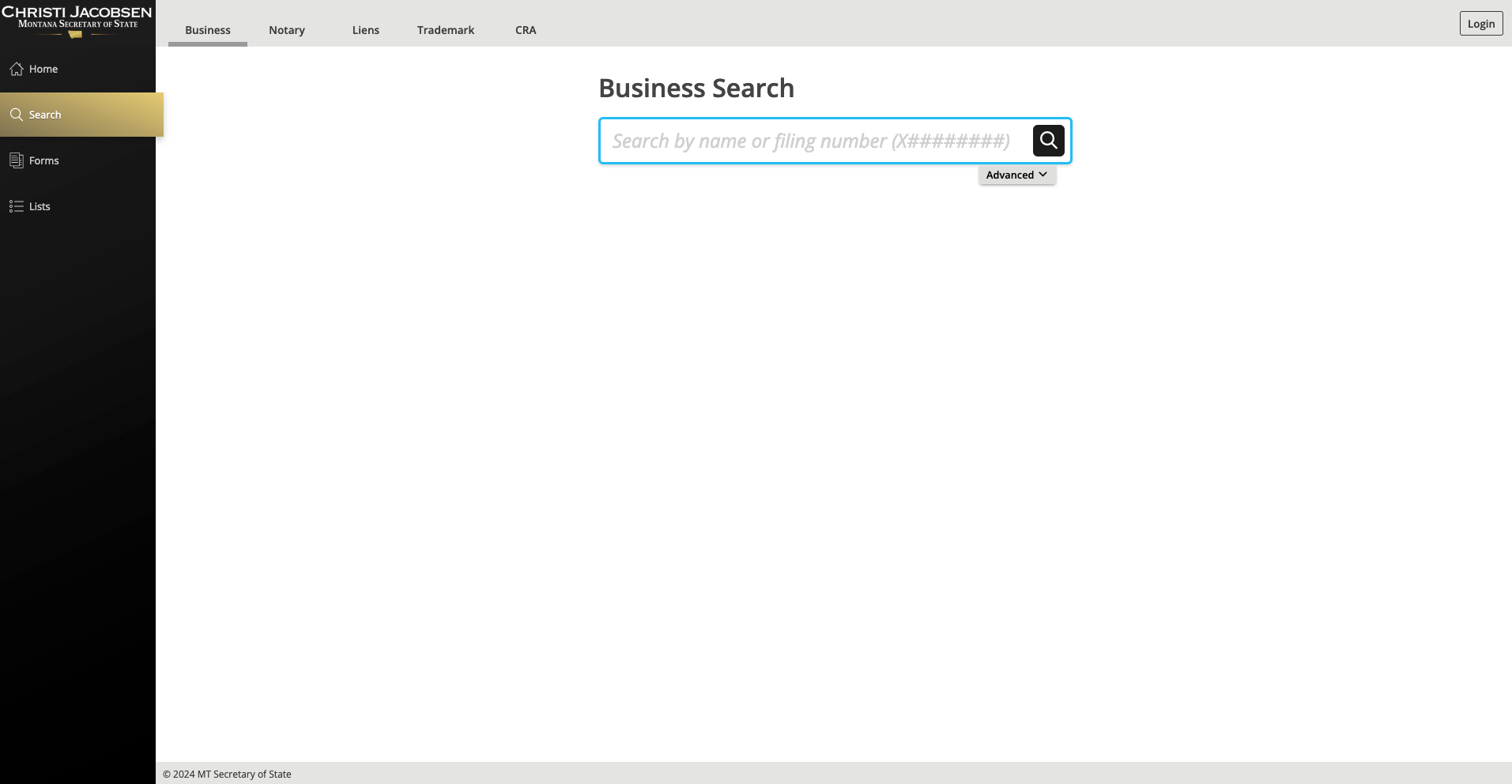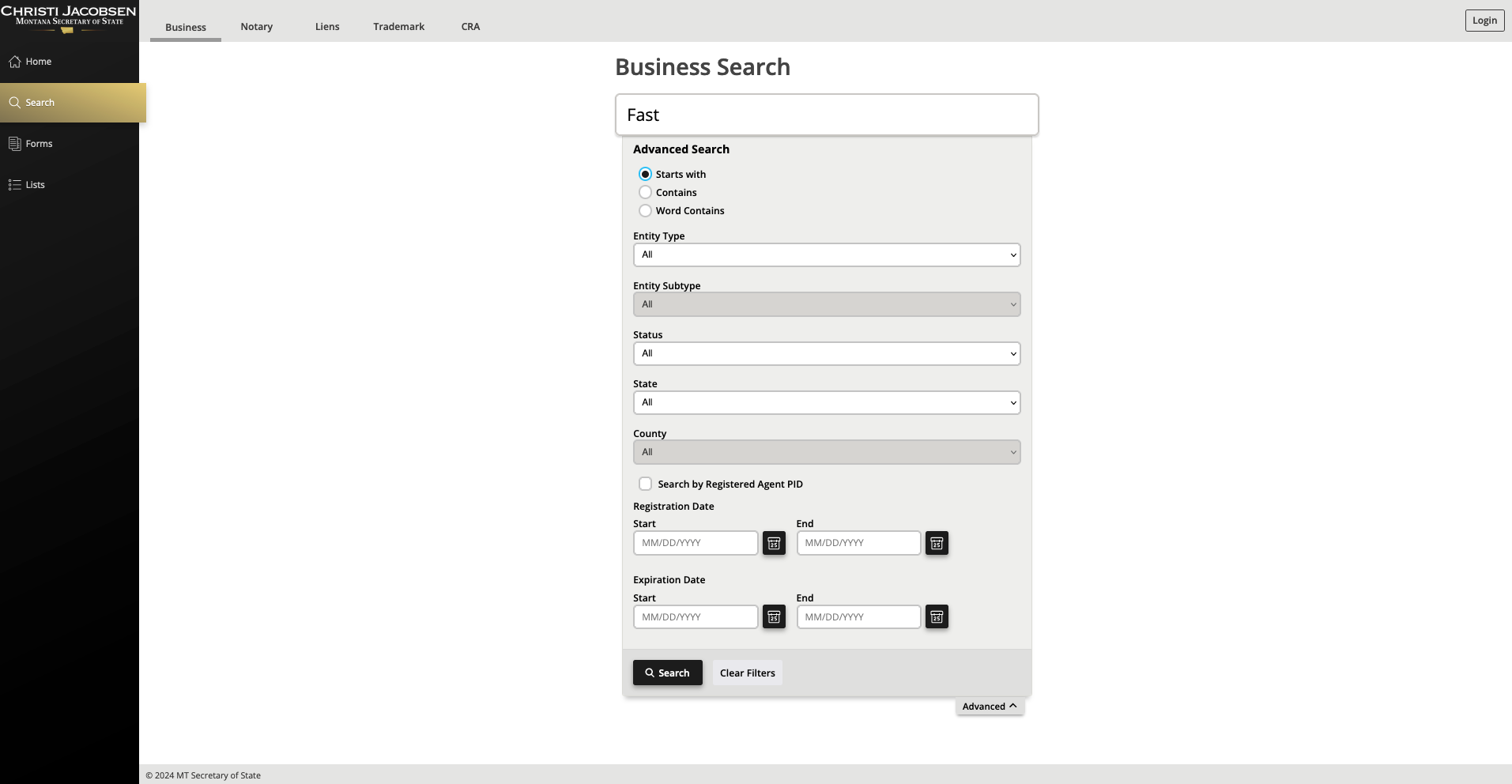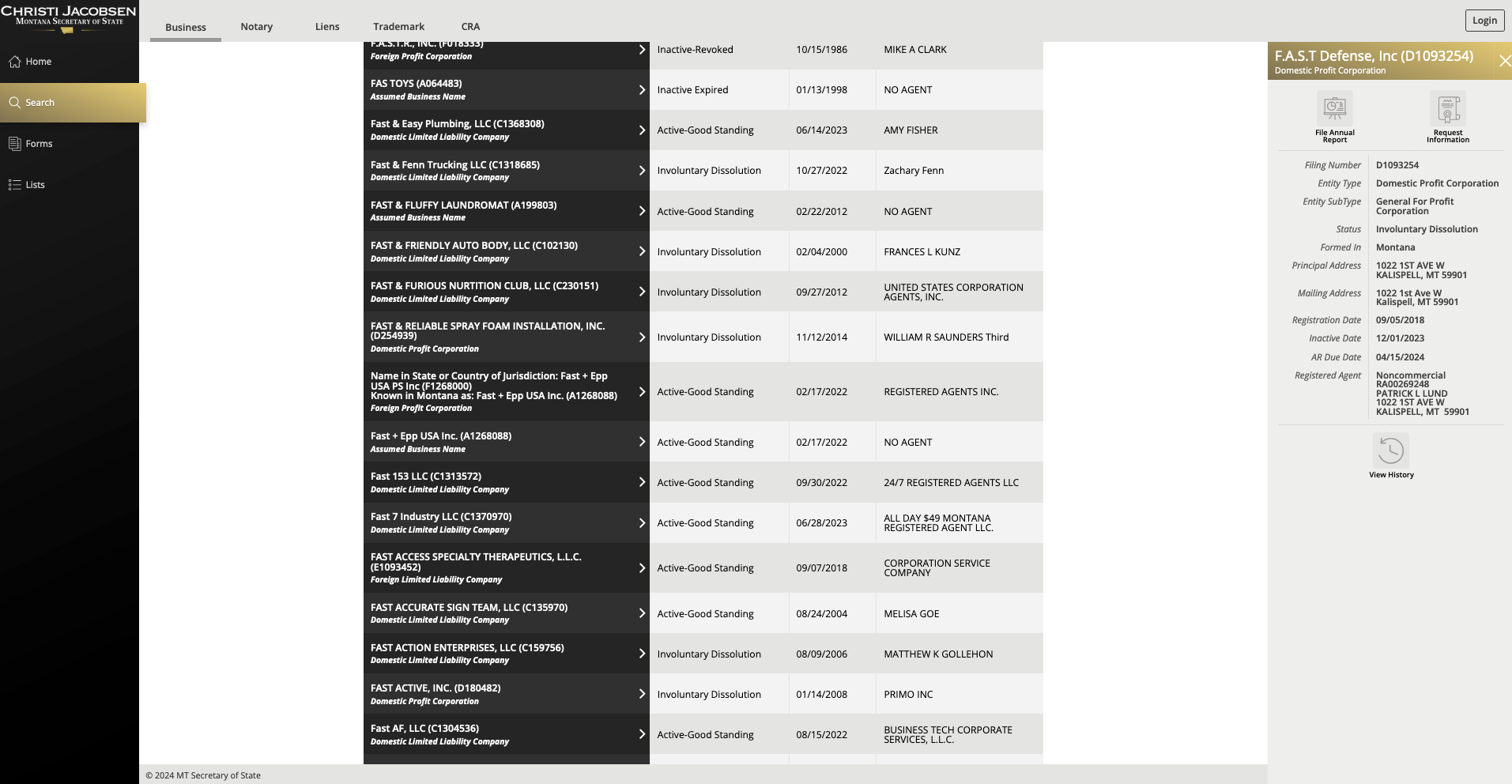Montana Secretary of State Business Search
Interested in doing business in the state of Montana? Here's how you conduct a Montana Secretary of State Business Search and register your business!
Access the Business Entity Search Page

First off, you'll want to visit the Montana Secretary of State's Business Entity Search page at biz.sosmt.gov. This page is your gateway to a wealth of information on businesses registered in Montana.
Input Search Criteria

Once you're on the search page, you'll see a field where you can enter the name of the business you're interested in. Just type in the name and hit the magnifying glass icon to start your search. If your needs are more specific, there's an "Advanced" tab you can use. This lets you refine your search by entity type, status, state, and county. You can also look for a registered agent or set a date range for any actions related to the business entity's paperwork. This versatility in search criteria means you can tailor the search to exactly what you need, making your inquiry more efficient.
Review Search Results

After hitting search, you'll be presented with a table that lists all the businesses matching your criteria. This table isn't just a list; it provides a snapshot of each business, including its form info, status, registration date, and agent. From here, you can click on the name of any business to dive deeper into its details.
Examine Business Entity Details

Selecting a business takes you to a page with a comprehensive overview of its filed information. You'll see the entity type, current status, any previous names it's gone by, registration dates, and addresses. For anyone needing even more detailed information, there's an option to request additional documents or details directly from this page.
For entrepreneurs in the process of registering a corporation or LLC, this step is important. Ensuring your chosen business name is unique and adheres to Montana's specific naming guidelines is essential. These guidelines require that the name include certain words or abbreviations indicating its business structure—for corporations, terms like "corporation," "incorporated," etc.; for LLCs, phrases like "limited liability company," "limited company," etc. The name must also be clearly distinguishable from other business names already registered in Montana and should not suggest an unauthorized business purpose.
Before you settle on a name, consider checking domain name availability and trademarks. This additional step helps ensure that your business name stands out not just within Montana, but across the web and in the broader marketplace.
Best Practices for a Successful Search

Navigating the Montana Secretary of State's Business Entity Search page is straightforward, but here are a few tips to make your search more effective**:
- Use Specific Search Criteria: The more precise your search criteria, the more relevant your search results will be. If you're looking for a particular type of business entity or status, use the advanced search options to narrow down your results.
- Review Multiple Entries: If your initial search returns multiple results, take the time to review each one. Sometimes, businesses with similar names or variations of a name you're interested in might provide unexpected insights.
- Regular Updates: Keep in mind that new businesses are registered, and existing information is updated regularly. If you don't find what you're looking for, it might be worth revisiting the site at a later date.
Starting a Business in Montana: What You Should Know

When you're setting your sights on launching a small business in Montana, it pays to be prepared. From the ground up, creating a solid foundation means knowing what steps to take, understanding your tax duties, and getting to grips with the necessary paperwork. Here's a straightforward guide to help you navigate the process without getting tangled in complexities.
Choose Your Business Structure Wisely
Your first step is to decide how you'll structure your business. Will you go solo with a sole proprietorship, team up in a partnership, form a limited liability company (LLC), or perhaps set up a corporation? Each option comes with its own set of rules, especially concerning legal matters and taxes.
Naming Your Business? Register It
If your business operates under a name that's not your own, you'll need to register this name with the Montana Secretary of State. It's a necessary step to ensure your business name is legally recognized.
Get Your Paperwork in Order
The type of organizational documents you need to file depends on your business structure. For instance, LLCs need to submit Articles of Organization. This paperwork is necessary for formally establishing your business with the state.
Don't Forget About Tax IDs
You'll need a Federal Employer Identification Number (EIN) from the IRS, plus you might have to register with the Montana Department of Revenue for state taxes. These IDs are essential for tax purposes.
Understand Your Tax Responsibilities
Be aware of your tax obligations, both at the federal and state level. This could include income tax, withholding tax, and other specific business taxes, depending on what your business does.
Protect What's Yours
Consider safeguarding your business assets through trademarks, copyrights, or patents. It's an important step for protecting your intellectual property against misuse or theft.
Licensing: Know What You Need
Montana doesn't issue a general business license, but your business might need specific licenses based on what it does. It's essential to research and obtain the correct licenses to operate legally.
Hiring? Follow the Rules
If you're planning to hire employees, make sure you comply with employment laws, which include getting workers' compensation insurance, unemployment insurance, and adhering to new hire reporting requirements.
Research and Planning Are Key
Take advantage of resources like the Montana Small Business Development Center (SBDC) Network for training and workshops. Doing your homework to understand your target market is vital for success.
Finance and Plan Your Business
Creating a detailed business plan and figuring out your financing needs are steps you can't skip. Seeking advice from legal and tax advisors is also a smart move to ensure you're on the right track.
Keep Up with Ongoing Requirements
After your business is up and running, stay on top of estimated income tax payments, payroll tax requirements, and any new legal obligations as your business evolves.
Breaking Down Initial Formation Costs
Starting your business comes with its own set of initial costs**:
- Articles of Organization for LLCs: Filing online costs $35. If you're setting up a Series LLC, add an extra $50 for each series member.
- Foreign Filings: For businesses established outside Montana but operating within, it's $70 for a Certificate of Authority, plus $50 per series member in a Series LLC.
- Annual Reports: File before April 15th for $20; after this date, the fee goes up to $35.
- Business Name Reservation: Got a name in mind? Reserve it for $10.
- Assumed Business Name Registration: If your business operates under a different name than its official one, register it for $20.
Ongoing Operational Costs
Running your business also involves various ongoing expenses**:
- Tax Identification Numbers: The EIN from the IRS is free, but state tax registration might cost you, depending on your business activities.
- Tax Obligations: Expect to handle various taxes, including income and withholding taxes. The costs depend on your business type and earnings.
- Licensing and Permits: There's no one-size-fits-all business license in Montana, so your costs will vary based on what your business does and where it's located.
- Workers' Compensation Insurance: If you have employees, this is a must, and costs will vary with your payroll size and the nature of the work.
- Registered Agent Fees: You can be your own registered agent or hire someone, with fees ranging from $50 to several hundred dollars annually.
Additional Considerations
When planning your budget, don't overlook these potential costs**:
- Intellectual Property Protection: Securing your business's intellectual assets can vary in cost, depending on what you're protecting and the application's complexity.
- Professional Advisors: Legal and tax advice is invaluable but comes at a cost. However, it's essential for compliance and financial optimization.
- Market Research and Business Planning: Free resources are out there, but thorough market research and professional planning might require a more substantial investment.
Local Licensing Costs
Keep in mind that licensing fees can vary greatly within Montana:
- City/County Specific Licenses: The cost to license a business in Helena with five to ten employees is $50, while a home-based business in Missoula has different fees. The key here is that costs can differ widely based on your business's location and type.
Additional Resources at Your Fingertips
Remember, you're not alone. Montana offers several resources, like the SBDC Network for consulting and training, and the eStop Business Licenses Program for navigating state registrations and licenses. Plus, the Montana Department of Revenue is there to guide you through state tax information and relief programs.
Conclusion
Whether you're at the brainstorming stage of starting a new business or conducting competitive research, the Montana Secretary of State's Business Entity Search page is a valuable tool. By following the steps outlined above, you can gain insights into business names, statuses, and other critical information that could influence your business decisions. With this guide, navigating the search process should be a breeze, providing you with the information you need to move forward with confidence.
Related Business Search Articles
- Wisconsin Corporation Search
- Louisiana Business Entity Search
- North Carolina (NC) Secretary of State Corporation Search
- Utah Business Entity Search
- Illinois Business Search
- Delaware Business Entity Search
- Nevada SOS Business Search
- Florida Business Entity Search: FL SOS & SunBiz Search Guide
- Oregon Business Search
- Maryland Business Search
- Idaho Business Entity Search
- CT Business Lookup: Search for a Business in Connecticut
- Minnesota SOS Business Search
- New Jersey Secretary of State Business Search
- Texas Secretary of State Business Search (SOS)
- Michigan Business Entity Search
- New York Secretary of State Business Search (NY SOS)
- Arkansas Secretary of State Business Search
- Colorado Business Entity Search
- Massachusetts Business Entity Search
- Oklahoma Secretary of State Business Search
- New Hampshire (NH) Business Entity Search & Lookup
- Kansas Business Entity Search (KS SOS)
- Pennsylvania Secretary of State Business Search
- Tennessee Secretary of State Business Search
- Ohio Secretary of State Business Entity Search
- Montana Secretary of State Business Search
